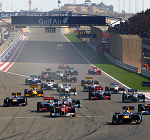A year ago the Grand Prix in Bahrain was cancelled because of demonstrations by the country’s approximately 70% Shia majority, protesting their second class status. Bahrain was a creation of the British and the ruling Al-Khalifa family derives its present stability from its alignment with Saudi Arabia. This year the event went ahead on April 22 despite continuing protests. Even though the usual champagne popping seemed a bit forced, the race was attended by the King of Bahrain and was won by Red Bull driver Sebastian Vettel.
The kingdom of Bahrain, with a population of 1.2 million, had a GDP of over $20 billion in 2010, the latest year for which statistics are available. Per capita income is approximately $16,500, but the Shia majority is known to be much poorer than the privileged 30% Sunni minority. Bahrain is reported to have spent $90 million to build the track, and paid some $40 million to Formula 1 event-managers for the privilege of hosting the race. It was viewed as a matter of pride for the royal family, which first brought the event to Bahrain in 2004. This year, the event was expected to yield $500 million in endorsements and visitor spending, easily a more important consideration than a fleeting protestors’ tarnish to the Kingdom’s reputation.
The royal family, whose wealth is estimated upwards of $5 billion, did not see the event as a ‘Formula for Blood’ as the opposition dubbed it. Instead they projected it, in the words of the Crown Prince Salman bin Hamad Al Khalifa, “as a force for good” and a way to celebrate and unite their great country. He also warned that its cancellation would “empower extremists.”
The chief executive of F1, Bernie Ecclestone, had earlier stated that the protests had “nothing to do with us” and that there was no problem in Bahrain with free speech since protesters were able to talk with the press.
While such disdain for the courage of the protesters was only to be expected from Formula 1, what was more objectionable was that the Prime Minister of the UK would come in with a strong endorsement for the government of Bahrain. Perhaps encouraged by the support of only 17 MPs to a cross-party motion calling for its cancellation, Prime Minister David Cameron helpfully clarified that “Bahrain is not Syria. There is a process of reform under way and this government backs that reform and wants to help promote that reform.” Not at all surprising from a government that will not even consider dropping Dow Chemicals as a $100 million sponsor of the forthcoming London Olympics simply because some 20,000 people died and thousands more are suffering the after-effects of the Bhopal gas tragedy perpetrated in 1984 by its recent acquisition, Union Carbide.
Despite Human Rights Watch saying that in Bahrain “normalcy doesn’t exist,” the United States government was tight-lipped – perhaps because the Fifth Fleet, responsible for naval forces in the Persian Gulf, Red Sea, Arabian Sea and coast of East Africa (including Somalia) as far south as Kenya, is based in Bahrain. Given the turmoil in the Middle East, the drawdown in Iraq and Afghanistan, active piracy off the coast of Somalia and the close identity of interests with Saudi Arabia over Iran and Syria, the U.S. is unlikely to speak about democracy or the human rights of a few hundred Bahrainis.
Nor can India, for more than half the expatriate population of 500,000 in Bahrain are Indians whose remittances are significant especially to the economy of Kerala. India itself hosted Formula 1 in October 2011 in the vicinity of New Delhi after spending at least $40 million on the inappropriately-named Budh International Circuit.
In all the excitement over Bahrain, the outcome of a 2012 study by Berkeley psychologists Paul Piff and Dacher Keltner carried in Scientific American which showed that the wealthier a person is, the less he/she is likely to empathize with the problems of the poor and disadvantaged, received no notice. That the organizers of sporting events for the super rich are unconcerned with the protests of the disempowered and the discriminated, should not come as a surprise. What is more worrisome is that globally, politics now responds only to the concerns of elites – dressed down as the middle class as revealed by the campaign rhetoric in the U.S. Presidential election, which inevitably trickles down to Europe and to our own developing world.
Neelam Deo is India’s former ambassador to Denmark and Ivory Coast, and served in Washington and New York. She is the director and co-founder of Gateway House: Indian Council on Global Relations.
This article was exclusively written for Gateway House: Indian Council on Global Relations. You can read more exclusive content here.
For interview requests with the author, or for permission to republish, please contact outreach@gatewayhouse.in.
© Copyright 2012 Gateway House: Indian Council on Global Relations. All rights reserved. Any unauthorized copying or reproduction is strictly prohibited.


